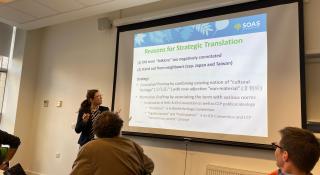
Breadcrumbs navigation
Film, narrative agency, and the politics of care in veteran Britain
In this short video extract, Nick Caddick discusses the key arguments from his new Review of International Studies article - Film, narrative agency, and the politics of care in veteran Britain co-authored with Sarah Bulmer, Katie Davies, David Jackson, James Duggan and Shreepali Patel.
Want to know more? You can read the full article at DOI: https://doi.org/10.1017/S0260210525000245
BISA members receive access to RIS (and to our other journal European Journal of International Security) as a benefit of membership. To gain access, log in to your BISA account and scroll down to the 'Membership benefits' section. If you're not yet a member join today.
Abstract
Film offers untapped potential for making critical interventions in world politics, particularly in ways that harness people’s capacity to narrate stories that creatively empower their communities. Combining International Relations scholarship on visual politics with narrative theory and feminist scholarship on care, this paper presents film as a means of exploring and expressing narrative agency; that is, the power to tell stories that represent people’s experiences in ways that disrupt hegemonic narratives. Dialectics of care and narrative agency are explored in the context of military-to-civilian ‘transition’ in Britain. We argue that the landscape of transition for military veterans is dominated by a preoccupation with employment and economic productivity, resulting in a ‘care deficit’ for veterans leaving the military. Through the Stories in Transition project, which used co-created film to explore narrative agency in the context of three veterans’ charities, we argue that the act of making care visible constitutes a necessary intervention in this transitional landscape. Grounding this intervention within feminist care ethics and the related notion of care aesthetics, we highlight the potential for film to reveal in compelling audio-visual narratives an alternative project of transition which might better sustain life and hope in the aftermath of military service.
Photo by Denise Jans on Unsplash


